Coronavirus Croatia: Journalist Details Self Isolation After Japan Return
March 4, 2020 - Ivan Buča, a journalist for 24 Sata, is currently under medical supervision in Croatia, after returning home from Japan, because of the coronavirus outbreak there. There are currently over 2000 people under supervision in Croatia, with some complaining that they feel harassed and stigmatized.
*Follow this article for live updates and this page for updates from Total Croatia News on the coronavirus in Croatia. An archive of updates can be found here. Contact numbers for epidemiologists, travel advisories and measures for preventing the spread of the coronavirus can be found here.
“What's up, friend? You're a coronaš now, eh?”
This message was an attempt to cheer me up by a ‘witty’ friend after learning that I was in home isolation because I had just returned from Japan. Unfortunately for my friend, I am not a 'coronaš' because I don't have any symptoms of the disease.
Croatia Journalist Under Supervision After Japan Return
But since Japan was added to the list of countries last week where the Ministry of Foreign Affairs does not recommend travel to, if not necessary, due to the coronavirus outbreak; I have been put under medical supervision for 14 days, Ivan Buča wrote for 24 Sata on March 3, 2020.
I am like many people who have returned from China, Korea, the affected areas of northern Italy in recent days…
The Ministry issued a travel advisory for Japan in the middle of my one-week visit to that country, where I was staying with about 20 other Croatians. On the same day, the Japanese Prime Minister decided that all schools and kindergartens would be closed for a month, and museums would shut their doors for two weeks. We were immediately aware that, upon returning home, we would be subject to expanded screenings at the airport and would be placed under medical supervision.
“Look at the bright side. At least we won't have to go to work,” some of my companions were cheering as we tried to dispel the discomfort of returning to Croatia by sharing various memes about the coronavirus (and there are some hilarious ones) on the plane.
Because after following the news from the homeland about empty shelves in shops, disguised protective masks and empty stands in HNL (Croatian First Football League) stadiums, we thought we would surely come home to a zombie apocalypse. Therefore, we might face the danger of someone firing upon us upon leaving the airport because we’ve come from the "corona zone".
Then we remembered that the stadiums in the HNL were empty and virus-free, so we didn’t feel so anxious.
“Easy for you. I work for foreigners. When I tell him that I must stay home, it will only make my e-mails even harder,” our guest worker has been inconsolable throughout the flight.
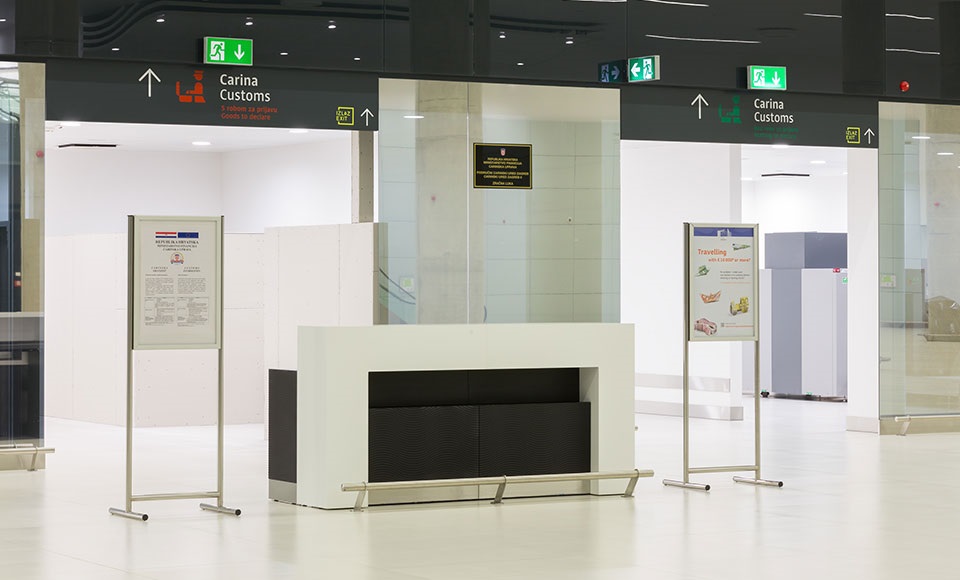
Customs | Franjo Tuđman Airport - Zagreb
Zagreb Airport Border Inspector: Report to Epidemiologist
After landing in Zagreb at the airport on Sunday, there were shared mixed feelings of immense happiness and uncertainty. Immeasurable happiness because, after almost 20 hours of flying, we can finally go to a normal toilet, and uncertainty because we know that we will not be able to leave the airport so easily.
As soon as we stepped off the plane, we headed to the counter of the Senior Border Inspector. There we were told that we would have to fill out the required forms first and then wait.
With all the praiseworthy efforts Croatia is making to curb the spread of the coronavirus, having only one sanitary inspector at the airport appears to be inadequate for the arrivals of large groups of passengers. And even the hand sanitizer fluid on the same counter would be out of the question.
But we patiently filled out the necessary forms - where we had been, where we were going, what we were doing, whether we were in contact with someone who was ill, did we have any symptoms…
At the counter, we also noticed brochures about the coronavirus, which were translated into Chinese, as well as several other flyers for travellers.
The coronavirus may currently be the "star" among infectious diseases, but it is not the only one that is dangerous, so there were also instructions about controlling the spread of the African swine fever.
About an hour later, we received a series of medical surveillance decisions “on suspicion of SARS-CoV-2” (the official name of the virus), ordering us to immediately contact an epidemiologist on duty, by phone or in person, as soon as we arrive.
Epidemiologist: Expect 14 Days in Home Isolation
The epidemiologist on duty, after finding out that I had no symptoms and that as far as I could tell I had not been in contact with someone who was infected, explained to me that I awaited 14 days in home isolation, which meant that I may not go to work, a grocery store, coffee shop or any other public place. I simply must stay home for 14 days.
Since the sanitary inspector's decision states that I will be fined for violating of health surveillance order; I looked up the penalties in the Law on the Protection of the People from Infectious Diseases. A real trifle - up to 5000 HRK (668 EUR) for per person.
That, in my opinion, is enough reason to comply with the decision. As for members of my household, it is my obligation to make sure that I do not cough or sneeze and that I isolate myself from them as much as possible. As I have no symptoms, there is no sneezing or coughing.
How to Self Isolate | Good Morning Britain
2400 Croatians Under Surveillance or Self Isolation
The epidemiologist on duty gave me contact information area epidemiologists, categorized according to address of residence. I need to check in with them on the phone every day during those two weeks and describe my health condition. If, God forbid, symptoms occur, I must call them immediately and without delay. It is estimated that more than 2400 people are currently under surveillance or self-isolation in Croatia.
Some have complained that this environment insults them and stigmatizes them as 'carriers', so it is important to emphasise that being monitored and self-isolated does not mean that these people are ill – but that they are behaving responsibly, to appease their immediate and wider relatives, work colleagues and neighbours based upon the fact that they were in countries where the virus has spread.
And so, during my first two days of home isolation, I appropriately contacted epidemiologists with my health information.
Presently, jet lag is my most troublesome symptom, which makes me wake up at two in the morning without fail because my body clock is still on "Japanese time".
Journalist Spends Isolation Watching TV: Soccer, Eurosong
Since much can be learned from health-conscious Japanese, I have applied some of their theories of healthy living. More than ever, I make sure I drink enough fluid and eat lots of fruit. Although I have no symptoms, I also take my temperature, because what is safe is safe.
And how do you make the time pass in home isolation? Well, writing texts is always an option. I haven't yet seen last year's hit series "Chernobyl", so I think it's somehow appropriate to address this now during this cataclysmic period.
While I was in Japan, Croatia had also consumed by the Dora virus, or the big “hateful” choice of a Croatian song for Eurosong. So, after returning to my own ears and eyes, I had to get acquainted with the musical and visual expressions of every participant. After watching all the performances, I realized that it would be better if I had skipped it because some performances will haunt me in dreams and nightmares.
And in the absence of sporting events, even those empty HNL grandstands from the perspective of home isolation seem tempting. And thank heaven for the televised dual of eternal rivals NK Lokomotiva and Slaven Belupo!
Coronavirus Health Surveillance: About Protecting Yourself and Others
All jokes aside, a level of health surveillance is essential and necessary, as much as it may seem to some to be a hassle. It is equally important to take care of my own and others' health. If I have learned anything in Japan, it is that they are the champions of caring for their own health and the health of others. They approach these difficult situations with a serious dose of caution, and without panic.
So, wash your hands well and preferably with soap and water, not ash, as the all-knowing epidemiologist (Zagreb Mayor) Bandić advised. Use hand sanitizer and cover your mouth sneezing or coughing and act responsibly.
How to Make Your Own Hand Sanitizer
On Tuesday March 3, 2020; the ninth case of the coronavirus was confirmed in Croatia. This is a young man from Varaždin who returned from Milan on February 24. The Croatia Border Inspection put him under surveillance and he’s now in the hospital.
What is Isolation?
For those who are ill: Complete quarantine or isolation refers to patients with coronavirus who are under controlled conditions in hospitals. They are completely isolated from the outside world, which means that they eat in the same space, but also go to the bathroom in the same space. That also has a protocol (before going to the bathroom, a certain agent must be poured into the bowl, and it is necessary to wait 10 minutes before flushing the toilet). This procedure was already reported by the twins, who were first in Croatia to be infected with the coronavirus.
What is Self-Isolation?
Sanitary Guidelines: Self-isolation is usually imposed upon people after a border inspection. We learned from the Professional Association of Drivers and Carriers that a certificate with instructions on self-isolation is issued at the border. These people can go to their homes. HZJZ Director Doctor Capak said such a person should not have contact with other people if possible.
Should you self isolate? | Good Morning Britian
What is Health Surveillance?
Reporting to an epidemiologist: Everyone who has been in the area affected by the spread of the infection is provided with guidance on health surveillance which can be active or passive. With active surveillance, epidemiologists personally call people on the phone and check for any symptoms (even the lowest fever, cough, snoring). Passive surveillance means that they must report to epidemiologists once a day on their own.
*Follow this article for live updates and this page for updates from Total Croatia News on the coronavirus in Croatia. An archive of updates can be found here. Contact numbers for epidemiologists, travel advisories and measures for preventing the spread of the coronavirus can be found here.
Dubrovnik on Endangered Cities List in New NASA Report
March 4, 2020 - NASA has released a world map of cities that could be endangered by rising sea levels. One point was located near Dubrovnik.
It is summer in Antarctica, and temperatures should be around zero degrees Celsius. However, in February, you could walk around in a spring jacket as the measured temperature was higher than Florida, writes Vijesti.rtl.hr.
Such climate change raises the world's sea level, as the glaciers are continuously melting. In Antarctica, a record temperature of 20 degrees Celsius was recorded at the beginning of February.
“This summer part of the year is record high. What is dangerous is the fact that it then melts snow and ice, and that snow and ice that is on land raises the sea level once it reaches the sea,” said climatologist and oceanographer Mirko Orlic.
In Antarctica, lakes have formed between glaciers that were not there before, NASA reported. But this is just part of it. Thus, NASA has released a world map of cities that could be endangered by rising sea levels. One point was located near Dubrovnik. Croatia could be hit with a harsh reality in the future.
"Everything is likely, but I am not afraid. It comes down to who is alive and who is dead in the hundred years. I am probably dead, and my descendants should think about what will be then," one citizen said.
The respected climatologist and oceanographer says Dubrovnik was taken as an example, but it is not the only endangered city in Croatia.
"We know that Rijeka is flooded already, as well as Split, Dubrovnik, and some lowland areas. The Neretva Delta is endangered, the hinterland of Zadar. Let's say that all Antarctic is dissolved, which will raise the sea level 57 meters. Of course, this can't happen in 100 years, but it can be because of episodes like this, and will be faster than we thought,” Orlic said.
Some cities on our coast have therefore already taken action. Šibenik-Knin County is the only one in Croatia that has already built coastal sea-level risk plans. Thus, they can advise people where to buy real estate and where their money might end up underwater.
If greenhouse gas emissions are reduced, the sea will rise by about half a meter and the consequences can be seen in 50 years. Stradun may not be underwater, but everyone’s favorite seaside spots may cease to exist.
To read more about lifestyle in Croatia, follow TCN's dedicated page.
UEFA Nations League: Croatia in Elite League A With...
March 3, 2020 - The UEFA Nations League draw was held in Amsterdam on Tuesday. Croatia will play in Group 4 against Sweden, France and Portugal.
Following the football excitement that awaits us at Euro 2020 this summer, we can also look forward to the new edition of the Nations League awaits in early September. The matches will be played in September, October and November this year.
Croatia will play in the elite League A against Sweden, France, and Portugal.
The first-ranked team from the group will play in the Nations League final tournament, and the last-placed team falls out of the strongest class.
The Nations League starts at the beginning of September this year (September 3-5) and the remaining dates September 6-8, October 8-10, 11-13, and November 12-14, 15-17 this year.
Croatia will play against the current world and European champions. It is interesting to note that the national team will play friendly matches against both teams ahead of the Euros. The 'Vatreni' has never defeated France or Portugal in history.
Sweden is 17th in the FIFA rankings and no easy game, but it is clear that France and Portugal will be the biggest rivals in the fight for first place leading to the Final Four.
Recall, Portugal won the first edition of the Nations League in 2019.
"We got probably the strongest group that could have been. But it's very nice, we will play against the European and world champions," Zlatko Dalic said, adding:
"We knew we were expecting tough opponents, as the whole group was like that. This will be good preparation for what awaits us later, which is Qatar qualifications. I think the competition is tough, that's what suits us and that's what we want."
League A
Group 1: Poland, BiH, Italy, Netherlands
Group 2: Iceland, Denmark, Belgium, England
Group 3: CROATIA, Sweden, France, Portugal
Group 4: Germany, Spain, Ukraine, Switzerland
League B
Group 1: Romania, Northern Ireland, Norway, Austria
Group 2: Israel, Slovakia, Scotland, Czech Republic
Group 3: Hungary, Turkey, Serbia, Russia
Group 4: Bulgaria, Ireland, Finland, Wales
League C
Group 1: Azerbaijan, Luxembourg, Cyprus, Montenegro
Group 2: Armenia, Estonia, Northern Macedonia, Georgia
Group 3: Moldova, Slovenia, Kosovo, Greece
Group 4: Kazakhstan, Lithuania, Belarus, Albania
League D
Group 1: Malta, Andorra, Latvia, Faroe Islands
Group 2: San Marino, Liechtenstein, Gibraltar
More soon...
To read more about sport in Croatia, follow TCN's dedicated page.
Coronavirus Croatia: Outbreak Significantly Reduces Easter Bookings
March 3, 2020 - Because of the coronavirus (COVID-19) outbreak, bookings for Easter in Croatia have been significantly reduced. However, some companies have figured out how to reduce cancellations of booked travel arrangements. They have decided to give tourists the option of cancelling their trip without penalty up two or three days before their scheduled arrival.
*Follow this article for live updates and this page for updates from Total Croatia News on the coronavirus in Croatia. An archive of updates can be found here. Contact numbers for epidemiologists, travel advisories and measures for preventing the spread of the coronavirus can be found here.
Familiar Words: No Reason to Panic in Croatia
On the other hand, tourism experts say that Croatia has no reason to panic according to Martina Pauček Šljivak/Index on March 3, 2020. Although everyone is keeping a close eye on what happens and how the situation develops, they say that the reduced number of Easter bookings is not necessarily cause for concern. But they added that the number of bookings is worse than last year. Nevertheless, they claim that those numbers should not be compared to last year, because these are two different scenarios.
Tomislav Fain, president of the Association of Croatian Travel Agencies, told Index that Easter bookings were slow and not going at the pace they went last year. However, he also said that some companies have made key decisions which have currently reduced the cancellations of travel arrangements for Croatia.
Some Croatia Partners Offer Last Minute Cancellations
"The bookings we have received have still not been cancelled to a large extent, most went to partners with reduced travel cancellation options. Some companies have thus decided to give clients the option of cancelling their trips even two to three days before their planned arrival to Croatia without having to pay a cancellation fee. We are all watching what is happening, both for our guests and us. We are all hoping that this situation will stabilize and that everyone will continue to travel normally. But the fact is that we do not have any new reservations for Easter," Fain told Index.
Index also spoke with Veljko Ostojić, director of the Croatian Tourism Association, who said that because of the coronavirus outbreak, some tour groups from Italy had cancelled their arrivals in Croatia for Easter. Some events in Croatia have also been cancelled, he revealed to Index.

Index
Bookings from Italy Down Significantly
"Easter bookings are down significantly, and inquiries have been reduced. But Easter falls on April 12 this year and all sorts of things are possible. So, if things get under control, we can expect the infected to be healthy within the next few days, so it's too early to assess what kind of results there will be for Easter," Ostojić added.
Last year, he said, there were more bookings at this time of year, but he also added that it was difficult to compare a normal year to this specific situation.
"Easter can be great and it can be bad, now people are monitoring the coronavirus developments in Croatia, and in their own countries. I think we have no reason to panic regarding this topic, and even if Easter is worse than last year, nothing dramatic will happen here. The four summer months are the most important to us and possibly some lost arrivals can be made up for later. There is no reason to panic," Ostojić concluded, echoing a familiar phrase.
Coronavirus Causes Cancellations of March Group Bookings
Croatian Minister of Tourism Gari Cappelli recently said that Croatian tourism is not feeling the downside of coronavirus outbreak for the time being, but that bookings have slowed down slightly, which he said was normal and to be expected. He added that the largest cancellations are currently happening in the business and congress tourism segment for March.
"The further spread of coronavirus in Croatia and the rest of Europe is difficult to project, but it is expected that it will have an impact on the first quarter's tourism results, though not too much, since the tourist turnover is normally lower in that quarter and the share of total annual revenue from tourism is about five percent," Cappelli assessed at a previous government meeting.

2000 Chinese tourists visited Croatia in February 2020, which was 60 percent less than 2019 | Index
2000 Chinese Tourists in February 2020: Down 60 Percent
He stated that there are currently about 24.5 thousand tourists in Croatia, which is similar to last year, and that the decline is mostly coming from Asian markets, especially from China, whose tourists numbered about two thousand, or 60 percent less in February than in the same month last year. However, in January this year there were almost four thousand or 70 percent more. Cappelli says tourism numbers are now about zero from that market compared to last year's results at the same time.
He also pointed out that in relation to the total tourist physical and financial traffic in the first three months of this year, due to the situation with the virus, they do not expect any major negative impact, except for the already mentioned segment of business and congress tourism, which happens in March.
Easter Earlier in 2020: True Tourist Picture Expected in May
"Easter is earlier this year, at the beginning of April, and when the holiday falls earlier it never provides a true picture of what will happen in the tourist season. This year, the real picture will be only be seen around the May holidays, when the largest number of Italian tourists arrive. Like Slovenes and Germans, they merge those holidays with others in their countries," added Cappelli.
He also noted that the last two years has seen a trend of last-minute bookings in May for the summer peak season, and for which he does not currently show any cancellations in Croatia. However, even in some of the major markets, like Germany and Great Britain, there has been a steady demand recorded with low growth compared to the same period in 2019.
Follow our Travel page for updates on Croatia tourism forecasts and statistics for 2020. The website for the Association of Croatian Travel Agencies can be found here, the Croatian Tourism Association here and the Croatia Ministry of Tourism here.
*Follow this article for live updates and this page for updates from Total Croatia News on the coronavirus in Croatia. An archive of updates can be found here. Contact numbers for epidemiologists, travel advisories and measures for preventing the spread of the coronavirus can be found here.
Zagreb Homeless Shelter to Close Because of Croatia Government Inaction
March 2, 2020 - Zagreb's homeless population could soon lose the roof over their heads. The only homeless shelter in Zagreb, which offers various forms of practical help and advice, is about to be closed permanently unless the Croatia government acts soon.
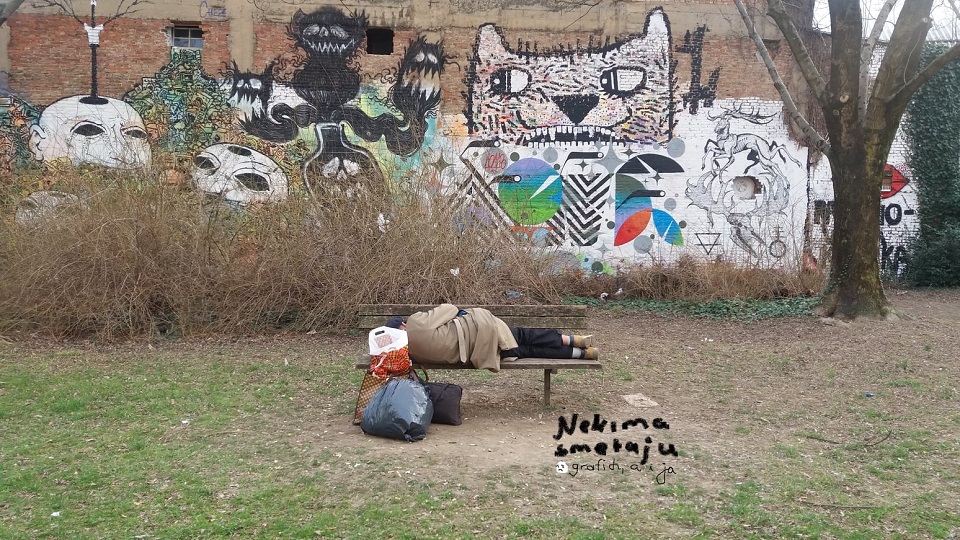
Homeless in Zagreb | HMB Facebook
Most Homeless Shelter Users Come from Slavonia
"This is the only place I can come without money and have coffee, get on the computer if I need to, or just warm up when it's cold… it’s the only place,” explains a younger user regarding his visit to the Homeless Assistance and Support Centre on Branimirova Ulica 53 in Zagreb. He is originally from Slavonia and, as he pointed out, would not know how to survive in Zagreb without this shelter, which is part of the Hrvatske mreže za beskućnike (Croatian Homeless Network).
"Because it's a relief to know that I can always come in from off the street if I need to or want to. Besides, we can also borrow a sleeping bag here or seek advice. It would be a big blow if they close the centre – for myself and many others,” he added.
Zagreb Shelter Will Close in Three Months: Contract Expires
As reported by Igor Lasić/DW on March 2, 2020; the Zagreb shelter's three-year contract with the government expires in three months. Therefore, by law, they will have to move out of their rented space. A new competition for a grant has not yet been announced. Even if it occurs in the meantime, it will be almost impossible for the rest of the procedure to be completed before that deadline. In reality, the work of the shelter can only be sustained by a gesture of extraordinary grace by the Government of Croatia, or the competent Ministry for Demography, Family, Youth and Social Policy.
"I found out about this shelter through Facebook. I’m from Slavonia and could not exercise my rights as a child of a war veteran, so I had to leave. The biggest advantage of this shelter is that it helps people find jobs. There is also a housing community, so that some people can find temporary accommodation here as well," the Slavonian continued.
The homeless young man has worked several jobs since, like food delivery and similar, but never for long. He has also worked abroad in entry-level construction jobs but said that he has faced various setbacks. He does not speak any foreign languages, so he cannot not even seek protection or better opportunities.
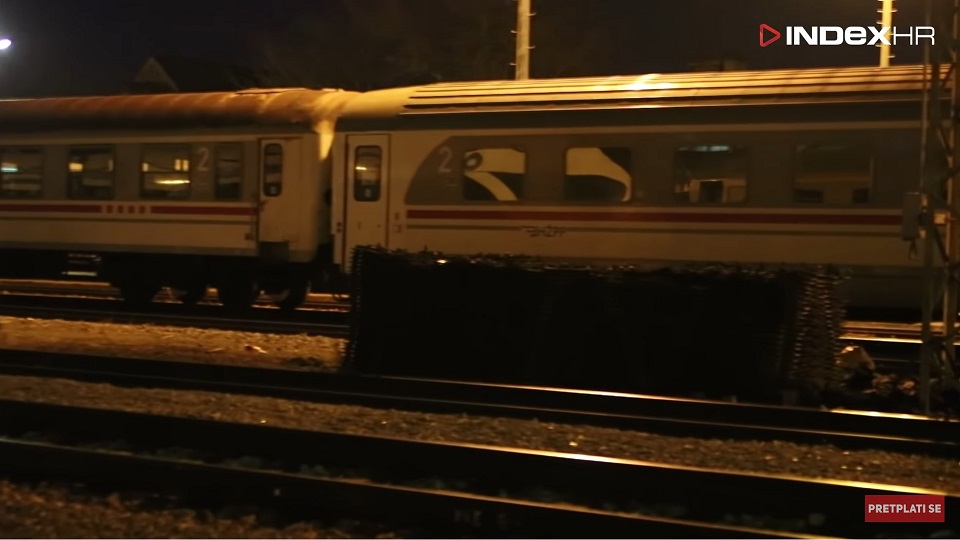
About 50 to 70 homeless live in abandoned railroad cars at the Zagreb Glavni Kolodvor according to HMB | Index YouTube
Thirty Visitors Per Day in Winter, 352 Registered Users
"Over twenty people come to our shelter daily, on average, and more than thirty in the winter, but we have a total of 352 registered users. Some just come for coffee, some for legal or other advice and some participate in our educational workshops. We also help users with finding a job, which is extremely important for re-socializing the excluded members of our society. But our best program is the residential community. In one apartment we have enabled a total of 32 younger users to become more independent over time and resume life from a more stable starting point. It is difficult for us, who have always had housing, to understand how important this is,” Slavko Mađor, manager of the shelter, revealed.
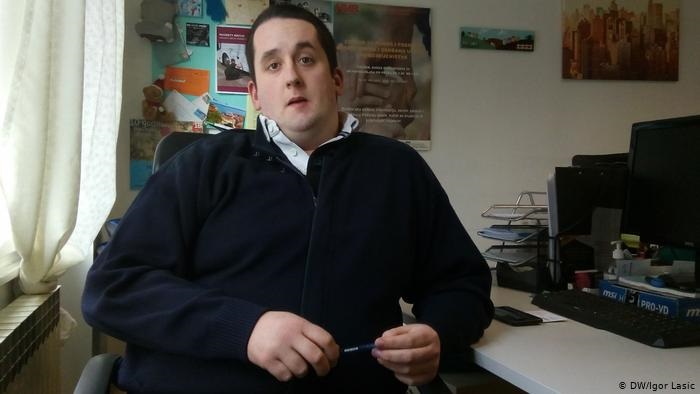
Slavko Mađor | DW Igor Lasic
"It is difficult for us to understand what it’s like when someone has to sleep in a public booth and then goes to work every day from there. Or how a person becomes homeless. Well, even my mother was surprised and asked me how this could be," explained Mađor.
Another user was from Zagreb. He did not want to be photographed or have his name published. With their permission, two other users were photographed at computers while working, but only from the back. It's not hard to grasp the backlash from publicity. An elderly lady sat in the entry, avoiding eye contact. Another entered the shelter and spoke to Slavko Mađor in English. She's French and has been coming for a while, and nobody knows what kinds of challenges she’s dealing with.
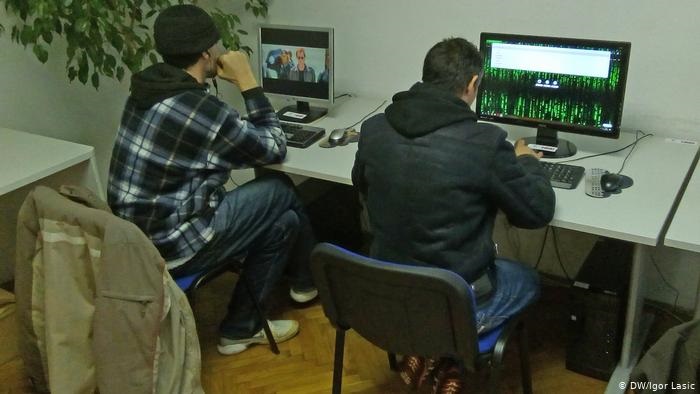
Zagreb Shelter Users | DW Igor Lasic
Shelter Offers Help, Food and Accommodation
"In a situation like this, it means a lot when people know that someone is available and willing to pay attention to them, let alone help with something else. This is more meaningful than just food and accommodation," summed up the man from Zagreb. He claimed to be 42 years old and is looking for a job after a temporary one ended, which he obtained through the shelter.
"In any case, I am not officially registered as a homeless person, but that is only because I can sleep with a friend in Velika Gorica right now," he explained.
"I used to be a waiter but now I’ll take any job I'm offered. And while I’m waiting, I’ll stop here and warm up, eat a sandwich, spend time at the computer and talk to people. We can talk like real people without fearing that someone will judge us because we are in a situation like this,” he added.

HMB Facebook
Only Homeless Shelter in Zagreb
The Homeless Help and Support Centre is just that: a place where the homeless can obtain help and necessities beyond just a meal or shelter. There aren’t any other facilities like this in Zagreb. And this is where the existentially afflicted from all over Croatia wind up. Most of them come from Slavonia because not only does Slavonia have the lowest standard of living and the weakest labour market; it also have the weakest social welfare system. But now the survival of this lone refuge is endangered, or at least extremely uncertain, until the government is willing to act.
Those who rely on this shelter to meet their essential needs and better their situation need not be left with a parting courtesy of hoping to meet again one day in the same place. In any event, upon vacating the building at Branimirova Ulica 53, at least the shelter will not have to remove their sign from the facade near the entrance, even if they must move out. It has already been removed, at the request of the occupants of the building, who own their homes.
Index Profiles Zagreb Homeless Man
Follow our Politics page for updates on this story and the challenges of the homeless population in Croatia. More information about the Hrvatske mreže za beskućnike (Croatian Homeless Network) can be found on their website here and Facebook page here.
Croatia Migrant Crisis: Interior Minister Will Not Send Army to Border
March 2, 2020 - Davor Božinović, the Interior Minister of Croatia, emphasised that there is no need to send the army to the border, because Croatia deals with illegal migrants daily. He added that Croatia’s border protection system maintains communication with colleagues from other countries on every level. And they are working together to pursue a diplomatic solution.
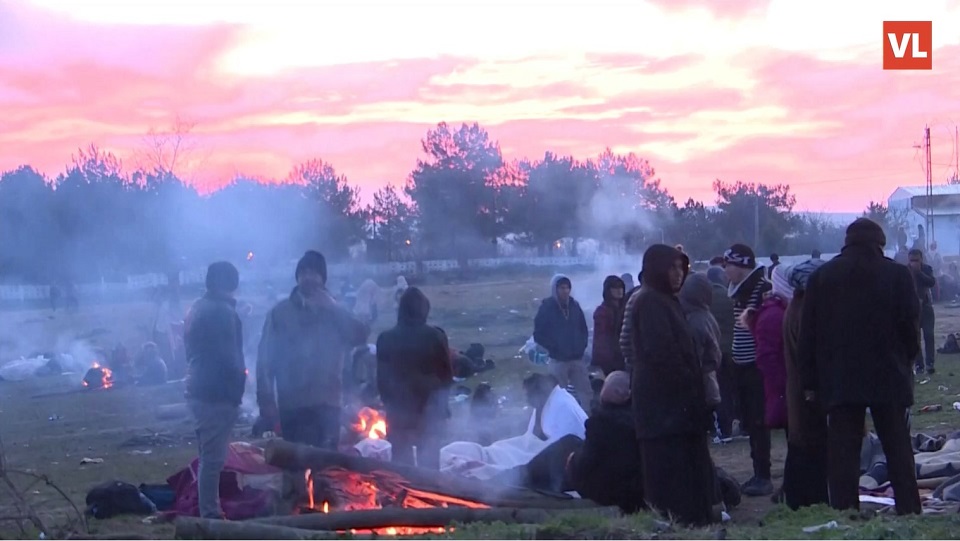
Croatia Eastern Border: No Increase in Illegal Migration
“There has been no reported increase in illegal migration on Croatia's eastern borders. The police are doing their job and the situation is no different than yesterday or the day before. Croatia has been dealing with illegal migration every day for almost three years now. That is why, even with these new circumstances, we can confirm that our border protection system fully operational and doing its job,” Interior Minister Davor Božinović said today. He noted that presently there is no need to send the army to the Croatian border, even though that remains a legal possibility, according to Marina Borovac/Večernji List on March 2, 2020.
“We will see how the situation on the Greek and Bulgarian borders develops, in relation to Turkey’s recent actions (release of migrants from their country). We are in close contact with our colleagues (from other countries) on every level. One direction we are going is certainly the diplomatic route. After all, the President of the European Council, the President of the European Commission and the President of the European Parliament will visit the Greek border tomorrow to see the situation there. At the same time, talks are underway with the Turkish leadership, which is part of the diplomatic role. The aim is to return to the EU-Turkey agreement of 2016,” Božinović added, and is confident that diplomacy would be the goal.
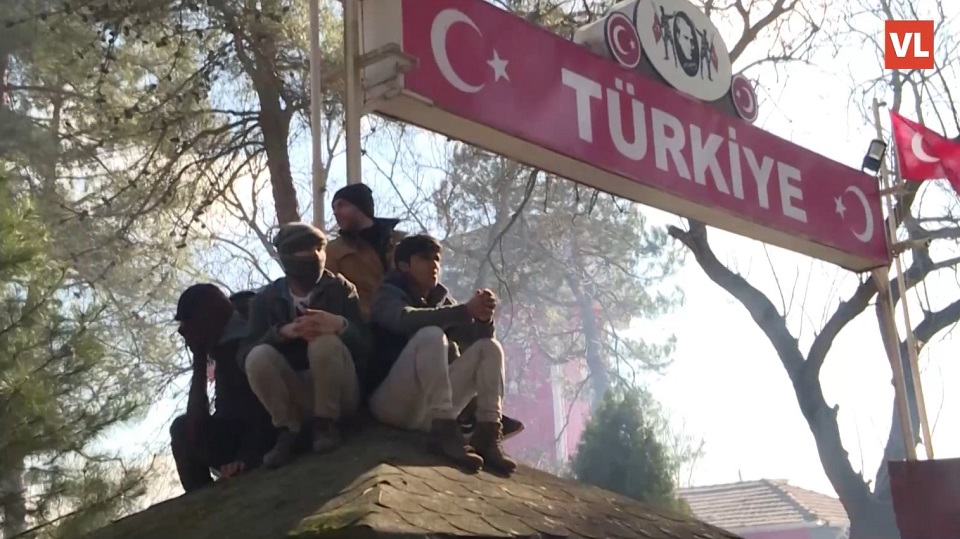
Croatia Will Discuss Border Assistance to Greece, Bulgaria
Božinović announced an upcoming meeting of European interior ministers to discuss what assistance can be sent to Greece and Bulgaria. He says both countries are committed to deterring illegal migration, which is in the wake of the new European Commission's policy regarding the protection of the EU's external borders. Božinović recalled that there was a migrant wave in 2015 because Greece had allowed migrants to pass through their territory.
“This is the only way to prevent the 2015 and 2016 scenario from happening again. Today, not only Greece, but every country has made their objectives very clear regarding the protection of their borders along the so-called Western Balkan route,” the interior minister concluded.
Croatia will emphasize its plight with protecting Europe's borders, but reiterates that the issue of the migrant crisis can only be resolved through (the agreement upon) a common European policy.
Follow our Politics page and this page to keep up-to-date on the migrant crisis along the Western Balkan route in Croatia.
Flights to Croatia: Croatia Airlines Boosts Zagreb-Amsterdam, New Condor Line to Dubrovnik
February 25, 2020 - The latest news from around Croatia’s airports for new flights to Croatia with updates from Zagreb and Dubrovnik.
Avio Radar reports that Croatian national carrier and Star Alliance member Croatia Airlines will strengthen the Zagreb-Amsterdam route in 2020. Namely, in addition to morning flights, a second flight on Tuesdays will be introduced in the afternoon. A total of eight flights per week will be offered. The additional flight on Tuesdays will run from April 28 to September 29, 2020. An Airbus A320 and Airbus A319 aircraft will serve this line.
The additional flight on Tuesdays is being introduced instead of the Dubrovnik-Pula-Amsterdam seasonal route, which will no longer be available.
Furthermore, Avio Radar reports that German airline Condor has begun selling tickets for a new seasonal route from Germany to Croatia. Namely, the Hanover-Dubrovnik route will be in service once a week, from Saturday, May 30 to October 24, 2020. An Airbus aircraft has been announced for this line.
This is the second Condor line from Germany to Dubrovnik in addition to the existing line from Frankfurt. Condor announced earlier that it would cancel the Hanover-Zadar route for this year.
Last year, Eurowings flew from Hanover to Dubrovnik twice a week, on Thursdays and Sundays, though that line is no longer on offer.
Ex Yu Aviation reports that Croatia Airlines has presented a plan for the near future. The national carrier will run three flights per week from Zagreb to Sofia and Podgorica this summer, as TCN already announced.
“We are expanding our network of destinations to a total of forty cities in 26 counties. That is a respectable number for a small nation such as Croatia,” said CEO Jasmin Bajić.
The new routes will not only help ‘point to point’ travelers but will improve loads on services to Western Europe by generating transfer traffic, Ex Yu Aviation said.
Furthermore, Croatia Airlines’ passenger numbers are up 1% thus far in 2020, though that could change with the spread of Coronavirus.
“It [virus] has had less of an impact on Croatia Airlines than other European carriers which are dealing with this major issue. Based on our advanced bookings for March, we do see a slump In demand compared to previous years. However, we are still not considerably affected”.
To read more about travel in Croatia, follow TCN's dedicated page.
EuroBasket Qualifiers: Croatia Basketball Tops Netherlands Away in Almere
February 24, 2020 - The Croatia basketball team beat the Netherlands away 69:59 in the second round of EuroBasket qualifications.
It was a duel of two teams that won the first round of Group D. While Croatia celebrated at home against a weak Sweden, the Netherlands shocked Turkey with an away win.
The Croatia basketball team and the Netherlands played in qualifiers for the last World Cup in China. Croatia's defeat in the first round was the beginning of the Croatian basketball downfall. The Netherlands, on the other hand, has progressed year after year.
After desperate past qualifications, Veljko Mrsic led a team that looked good in their debut against Sweden. Croatia finally had harmony and chemistry between the players again in the locker room. The approach was right after a long time. The defense was perfect, and the attack was played fast and easy.
The Netherlands led after the first quarter, with Croatia leading 38:35 at halftime, followed by the fall of Veljko Mršić's team in the third leg and a period in which only 9 points were scored.
In the last 10 minutes, however, Croatia rose to the occasion and eventually celebrated by 10 points.
Croatia's most efficient player was Ukic with 14 points, Dreznjak scored 13 and Planinic scored 12. The most efficient for the Netherlands was Franke with 11 points, while Kloof and Van der Vuurts each scored 10 points.
With this victory, Croatia has made a big step towards qualifying for the EuroBasket.
Recall, Croatia defeated Sweden 72:56 (18: 6, 23:14, 17:25, 14:11) in the first round of the Group D qualifiers for EuroBasket 2021. Turkey and Sweden are also in Group D.
EuroBasket 2021 will be held in Georgia, the Czech Republic, Italy and Germany. The three first-place teams will qualify for the EuroBasket.
Lineups
Netherlands: Charlon Kloof, Yannick Franke, Worthy de Jong, Mohamed Kherrazi, Jito Kok
Croatia: Roko Ukić, Filip Krušlin, Mateo Drežnjak, Željko Šakić, Miro Bilan
Source: Index.hr
To read more about sport in Croatia, follow TCN's dedicated page.
Croatia Gay Effigy Condemned: MP Files Criminal Charges Against Carnival
February 24, 2020 - MP Arsen Bauk SDP (Social Democratic Party) of Croatia has announced that he will file a criminal complaint against the organizers of the "Bakova povorka", which took place in the town of Imotski, at the local police station for burning an effigy of a gay couple. Zoran Milanović, President of Croatia, has demanded an apology from organizers and an appropriate response from the relevant legal institutions.
Numerous comments have appeared on social networks condemning the Imotski carnival (Bakova povorka), where an effigy of a same-sex couple holding a child was burned at the ceremony to widespread cheers. The child was presented in the form of SDP MP Nenad Stazić with a five-pointed star (Yugoslavia) on his forehead, according to Ana Roksandić/RTL Dnevnik on February 24, 2020.
Bauk to File Complaint Under Article 325 Croatia Criminal Code
Arsen Bauk has announced that he will file a criminal complaint against Milivoj Đuka, the organizer of the carnival parade, at the Imotski Police Station on Monday for the offense noted under Article 325 of the Criminal Code of Croatia.
There is a tradition of masks in Dalmatia, in which the people normally express their dissatisfaction with powerful political and social figures. However, the lynching of minority groups runs contrary to that tradition.
Croatia President Demands Appropriate Response for Shameful Event
Croatia President Zoran Milanović also responded to the "shameful event" on Monday morning.
"The symbolic burning of same-sex partners with a foster child in Imotski is a sad, inhumane and totally unacceptable act in the guise of the 'Bakova povorka' festivities. The organizers who staged this shameful event, in the name of tradition, deserve the strongest public condemnation because of the hatred they have demonstrated toward for others. Intolerance and inhumanity are not and will not be a Croatian tradition. I am seeking their public apology and the approptiate response reaction from the relevant institutions, especially as many children watched this event, thus witnessing the spread of hatred and inciting violence," he wrote on Facebook.
Former Croatia Prime Minister Jadranka Kosor reacted on Twitter:
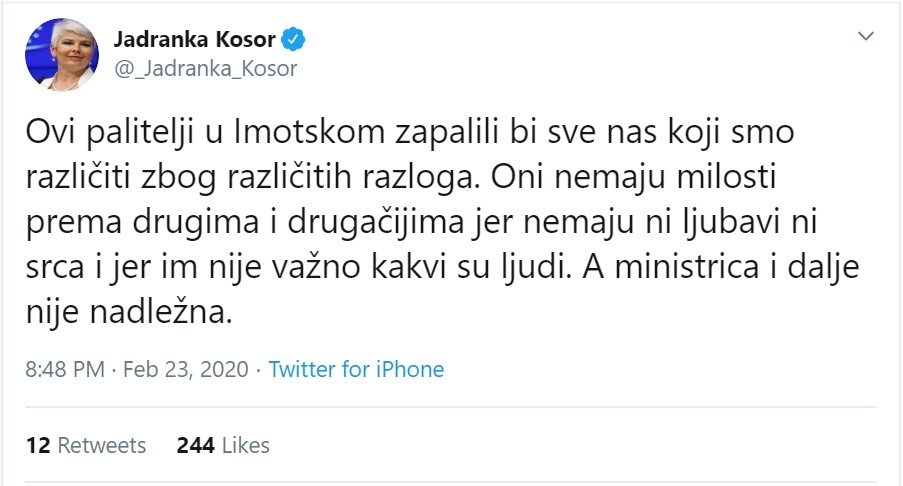
"These arsonists in Imotski would set fire to all of us who are different for various reasons. They have no mercy on others because they have neither love nor hearts and do not care what kind of people they are. And the minister is still incompetent," she wrote yesterday.
MP Bojan Glavašević also took to social networks to defend a same-sex couple, Ivo Šegota and Mladen Kožić, who want to adopt children.
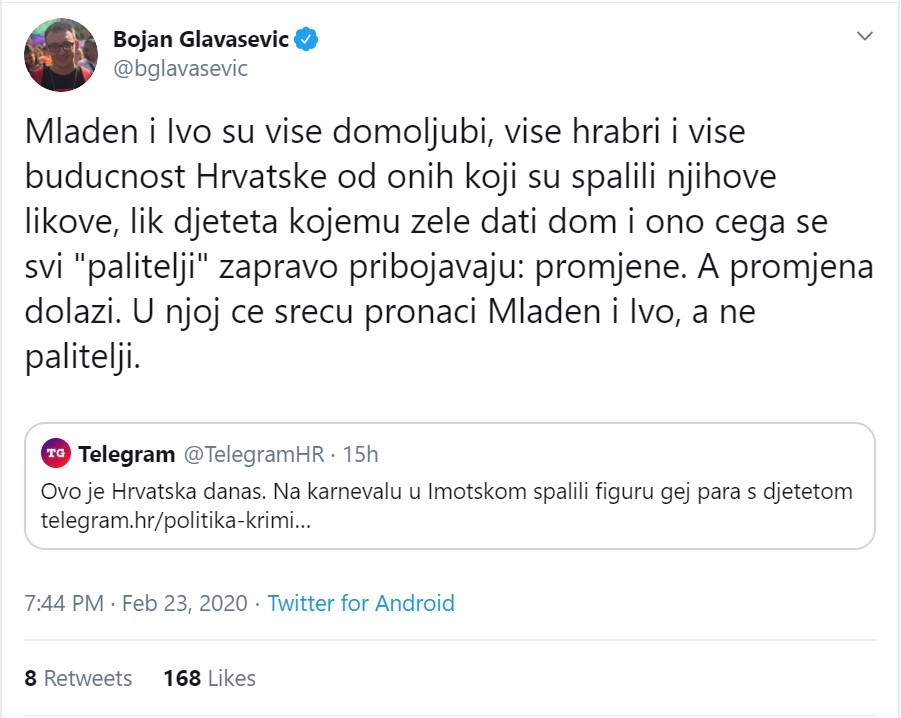
Croatia Gay Couple More Patriotic Than Imotski ‘Arsonists’
“Mladen and Ivo are more patriotic, more courageous, and more of a (positive) example for the future of Croatia than those who burned their characters, and the character of the child they wish to provide a home for. Change is what all these "arsonists" are truly afraid of. And change is coming. Within it, Mladen and Ivo will find happiness, not the arsonists,” he wrote in a Twitter post.
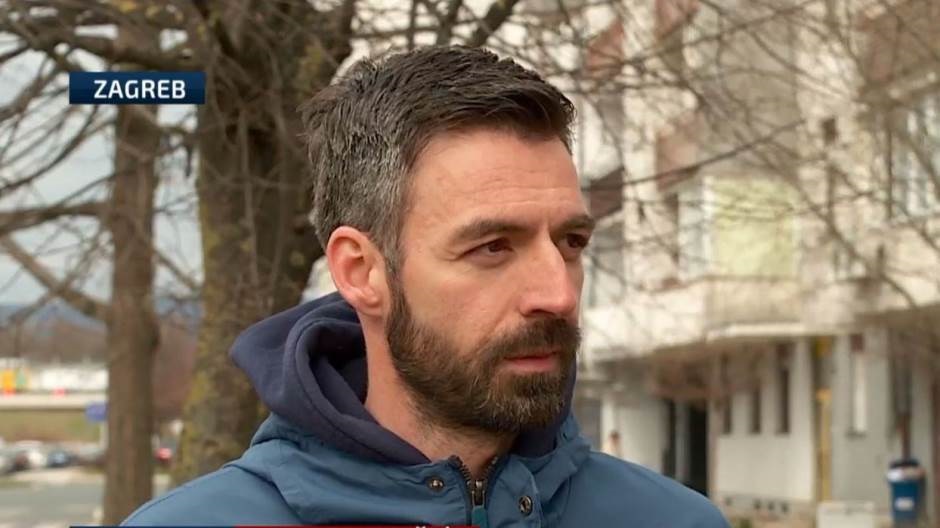
Kožić: 'I fear for all our friends who are already living with children in Croatia'
Mladen Kožić spoke to Hrvoje Krešić/N1 on Monday:
"This time I feel bad not only for myself, I am not afraid for either Ivo or myself, I fear for all our friends who are already living with children in Croatia," Kožić said.
"We know two fathers with a daughter in our first neighborhood and I feel bad for them because I cannot imagine how it must be for them now, and how they will explain to their children what exactly has happened," he added.
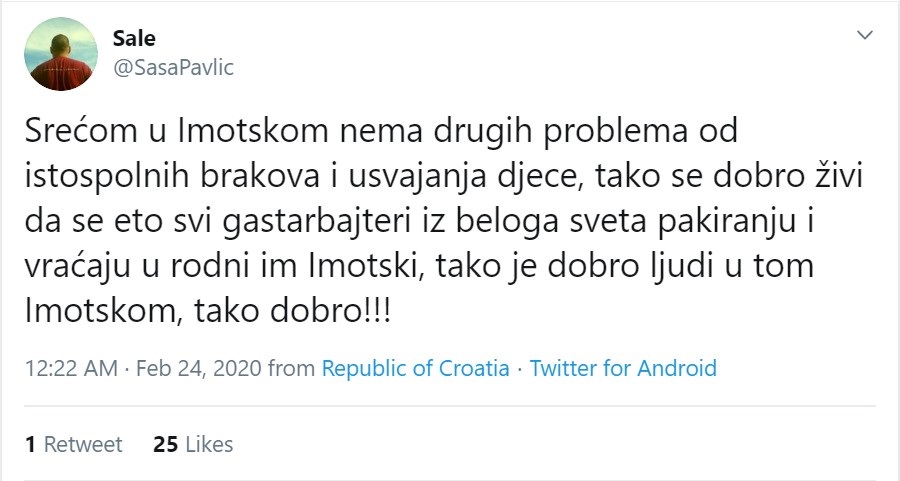
"Fortunately, there are no other problems in Imotski other than same-sex marriage and adoption of children, people are living so well there that all the gastarbeiters from this white world are packing and returning to their native Imotski, the people in Imotski have it so good, so good !!!", one Twitter user observed sarcastically. Milivoj Đuka, the parade's organizer, spoke to Dnevnik/HRT about the mass exodus from his hometown on June 21, 2015.
Interview with Đuka begins at 1:05.
Young Croatians Fleeing Imotski, Living Among Same Sex Couples Abroad
Thousands of young Croatians are fleeing to countries like Ireland, Sweden, Denmark, Germany and Austria where gay marriage and adoption are legal, and are living among openly gay and lesbian couples with children.
Another user emphasized that, according to carnival tradition, culprits should be burned for adverse behavior, not for adopting a child.
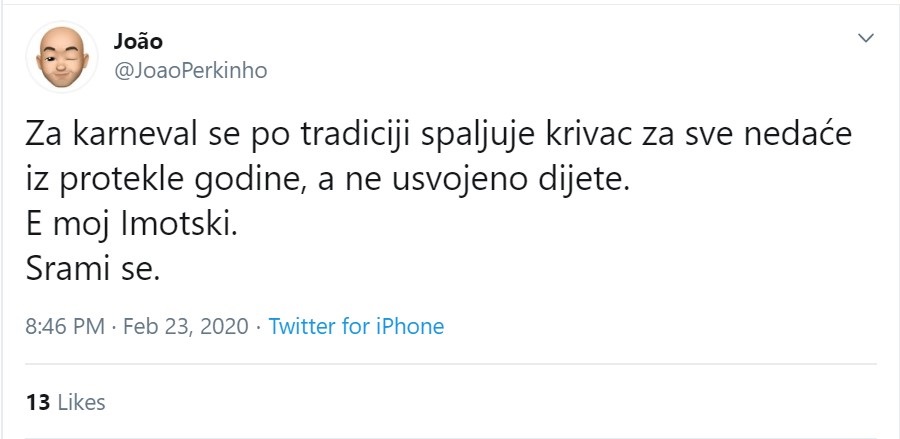
“According to tradition the carnival is traditionally an event to set fire to the culprit for all the troubles of the past year, not an adopted child.
My Imotski. Shame on you,” the user responded.
Act of hate speech?
Another user wondered if the gay couple effigy burning at the Imotski carnival was an act of hate speech.
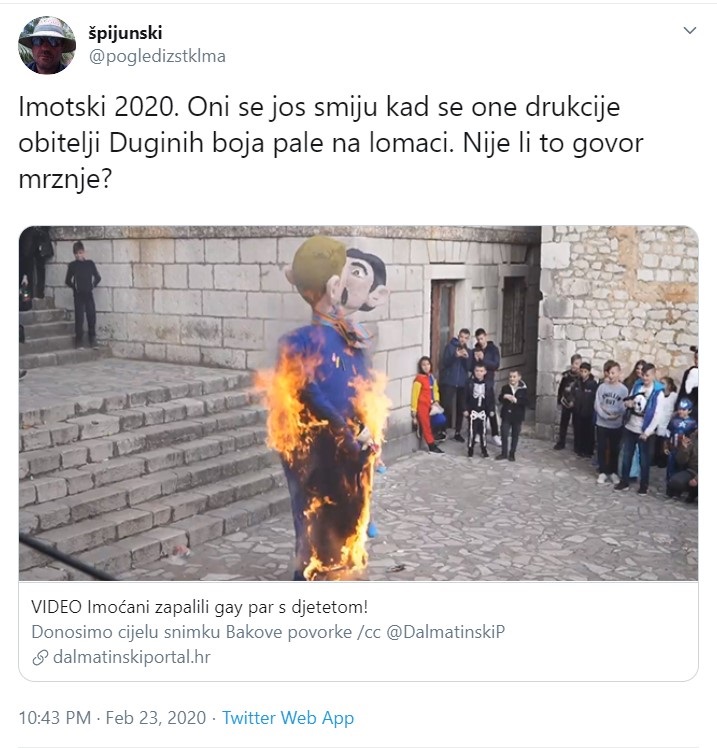
“Imotski 2020. They are still laughing when these alternative families of Rainbow colors fall into shambles. Isn't this hate speech?” the Twitter user asked.
The effigy of the gay couple is set on fire at 1:41:15 | Boško Ćosić Photography
See yesterday's Total Croatia News article about the effigy burning here. Follow our Politics page, Lifestyle page and this page for updates on this story and the state of LGBT rights in Croatia.
Croatia Town Burns Gay Couple Effigy at Parade: Imotski Residents Cheer
February 23, 2020 - Bakova povorka, the pinnacle of a 150-year tradition of carnival festivities in Imotski, Croatia was engulfed by scandal on Sunday afternoon when enthusiastic residents set fire to an effigy of a gay couple to widespread cheers.
Adopted Child Had Yugoslav Star on Forehead
Imotski residents chose to feature a gay couple with an adopted child, which had a five-pointed star on his forehead (resembling that of the Yugoslav flag) for the central carnival figure. They eventually set that effigy on fire and burned it to the ground to the cheers of onlookers.
“Like it or not, but this is abnormal for us, but everyone has the right to be whatever they want,” they proclaimed to onlookers.
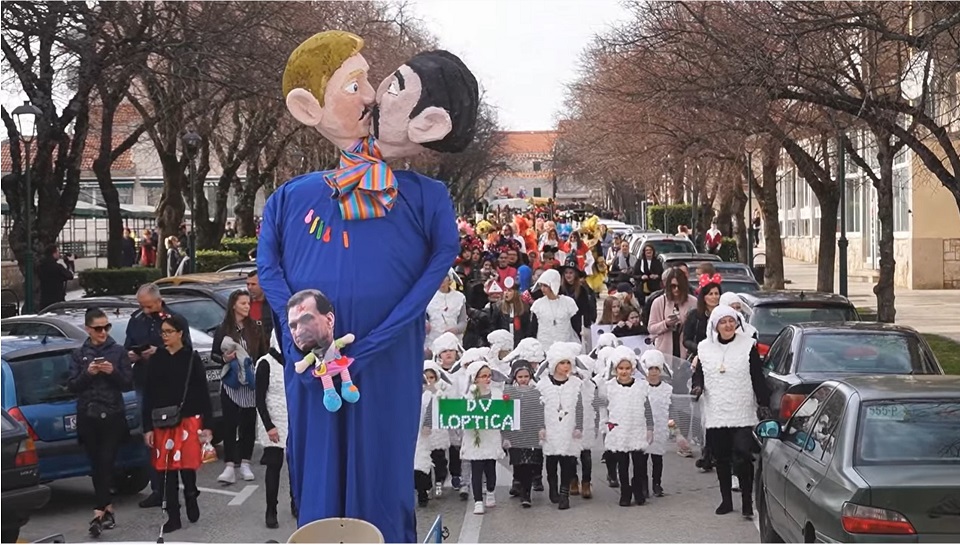
It’s also worth noting that the child doll, with the five-pointed star on his forehead and being held by the effigy of the gay couple, had the face of SDP (Social Democratic Party) MP Nenad Stazić. Earlier this year, it Stazić lent his support to same sex couples wishing to be foster parents. He also indicated that children were more at risk in the company of pedophile priests than under the care of openly gay foster parents. The effigy of the gay couple was followed by a group of children from the local kindergarten in the parade.
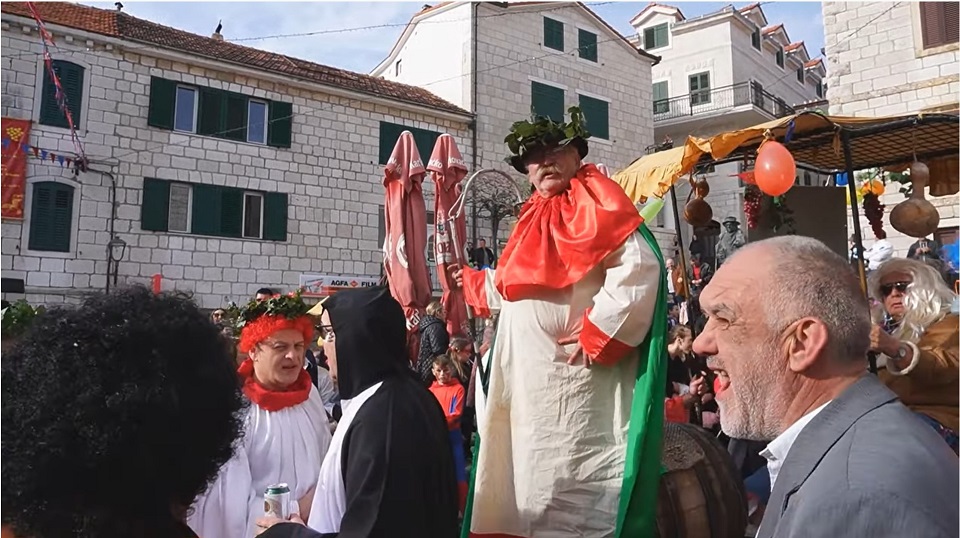
‘We are a conservative society’
"My head is spinning from this culture of death, and since my body is ailing, this year let’s set this grotesque family with baby Nenad Stazić on fire," the announcer proclaimed. Then, “Play the music" was heard as they ignited the effigy to wild cheers and applause.
When Slobodna Dalmacija asked Milivoj Đuka, president of the "Bako Ceremony Cultural Society" (KD Bakove svečanosti), for comment on February 23, 2020; he explained:
“We are a conservative society, and are sticking by tradition. Give a child to a mother, as the saying goes. We think this is the right thing to do,” Đuka claimed.
In an interview for Imotski Online on February 7, 2020; the festival's organizer had previously indicated that the main character of the parade would remain a secret.
"I can't reveal it to you. I can only say that everyone will understand who and what it is about," Đuka pointed out.
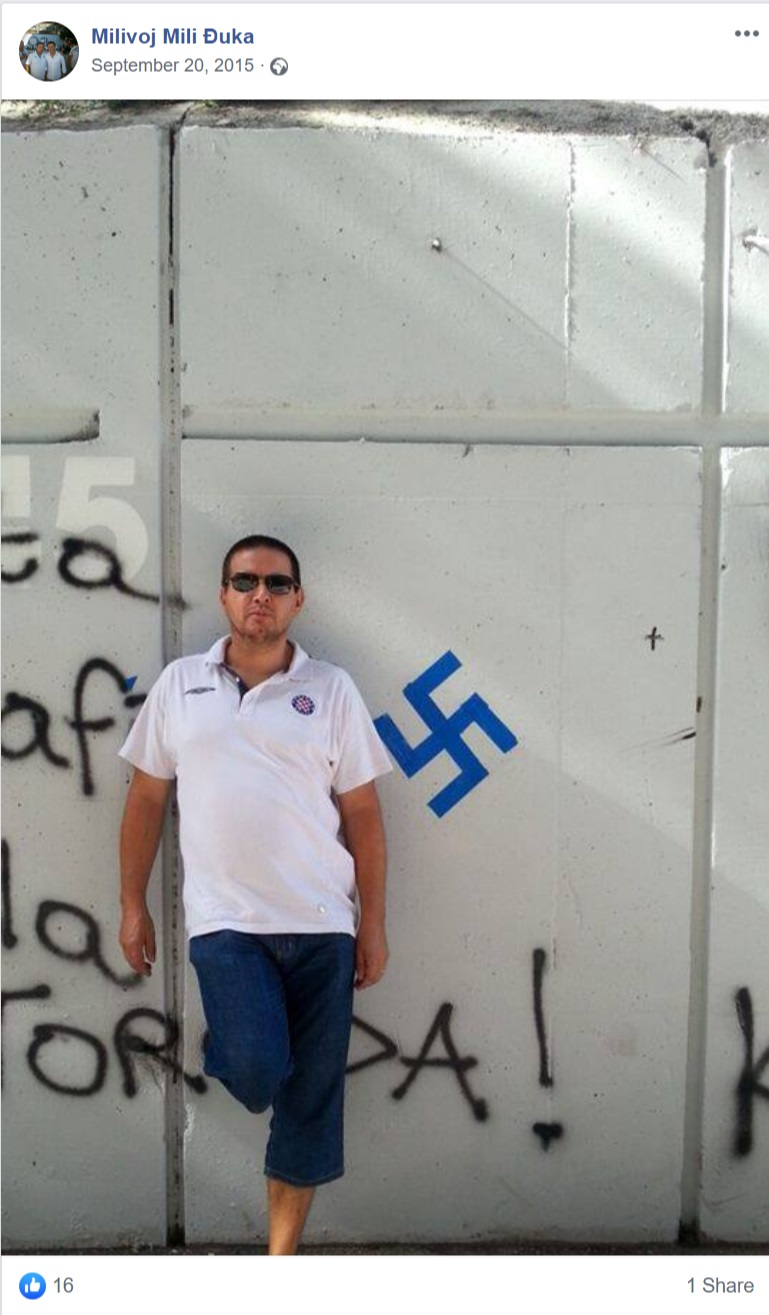
Milivoj Đuka | Facebook
According to a recent poll conducted by HRT (Croatia Radio Television); 63.7 percent of respondents are against allowing same-sex couples to be foster parents.
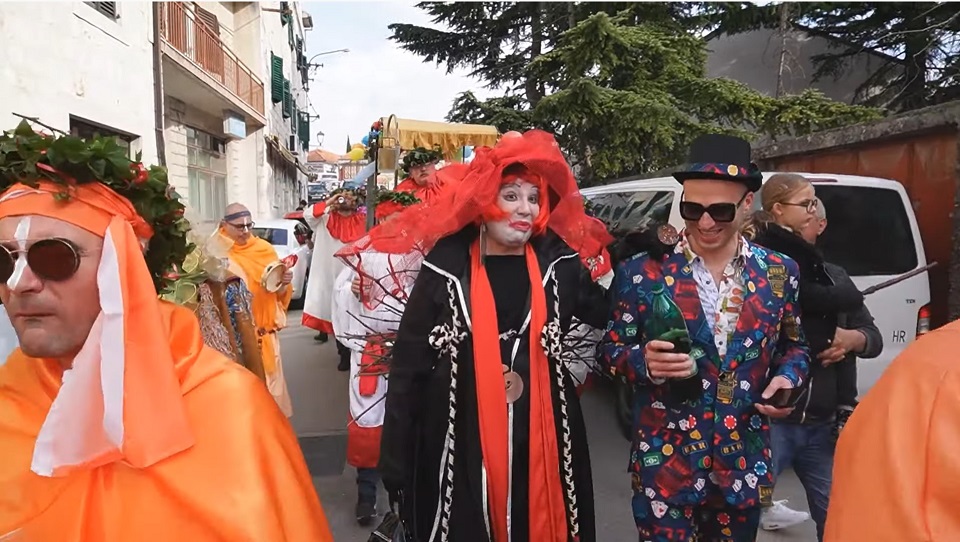
Croatia Parade Included Masks of Elvis Presley, Cleopatra, Josipa Lisac
Đuka made sure that there were as many masks as possible in the parade, all of which were made in homes throughout the town. Visitors also saw Nutcrackers, Cellists, Elvis Presley and his band, Flowers as well as individual masks of Cleopatra, and Pirates. In addition, there were homemade renderings of Croatia diva, Josipa Lisac, inspired by her performance at the inauguration of the new President.
The parade featured groups of children dressed like little lambs from the Kindergarten Ball, students from Imotski elementary schools, and many others.
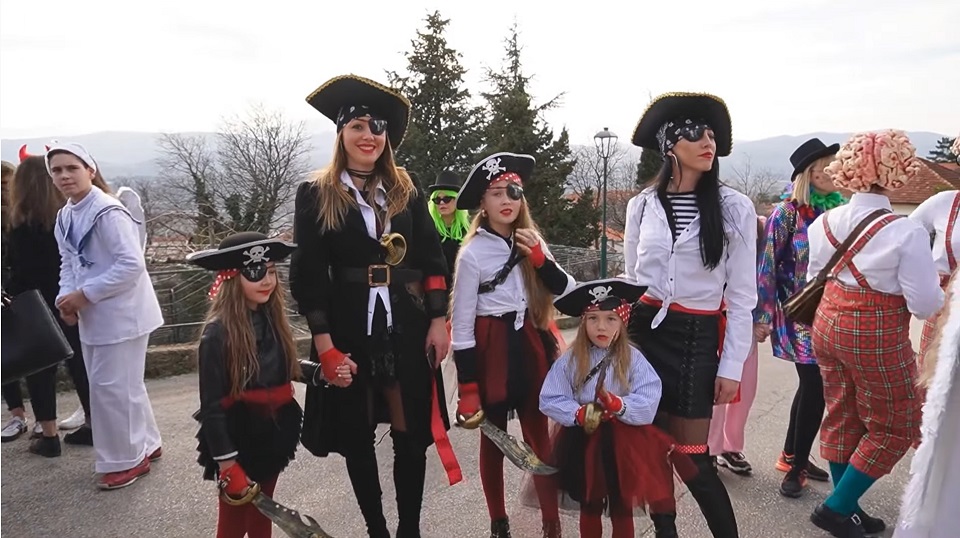
Members of the HPO Gradske glazbe Imotski (HPO Imotski Town Music Group), performed cheerful carnival songs for more than a thousand Imotski residents and their guests.
The effigy of the gay couple is set on fire at 1:41:15 | Boško Ćosić Photography
UPDATE February 24, 2020: Croatian leaders and citizens condemn effigy burning. MP Arsen Bauk files charges against event organizers.
Follow our Lifestyle page for updates on this developing story. More information on the "Bako Ceremony Cultural Society" (KD Bakove svečanosti) can be found on their website here and Facebook here.


